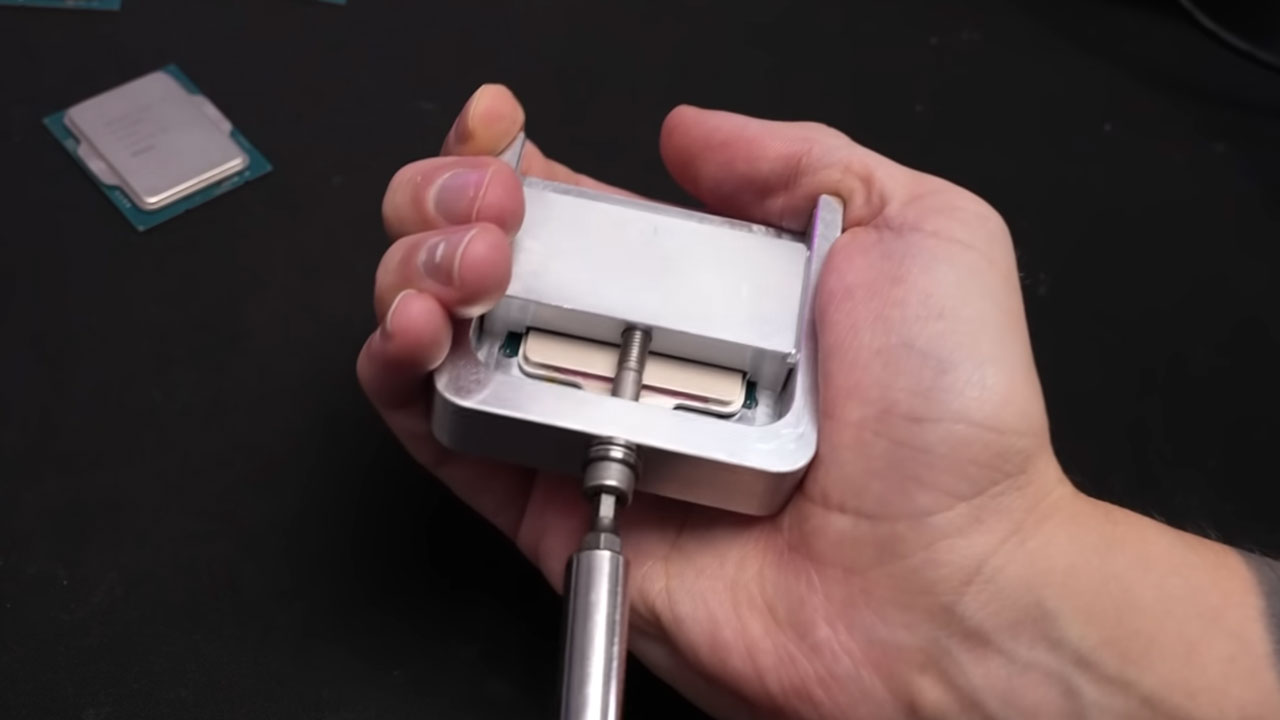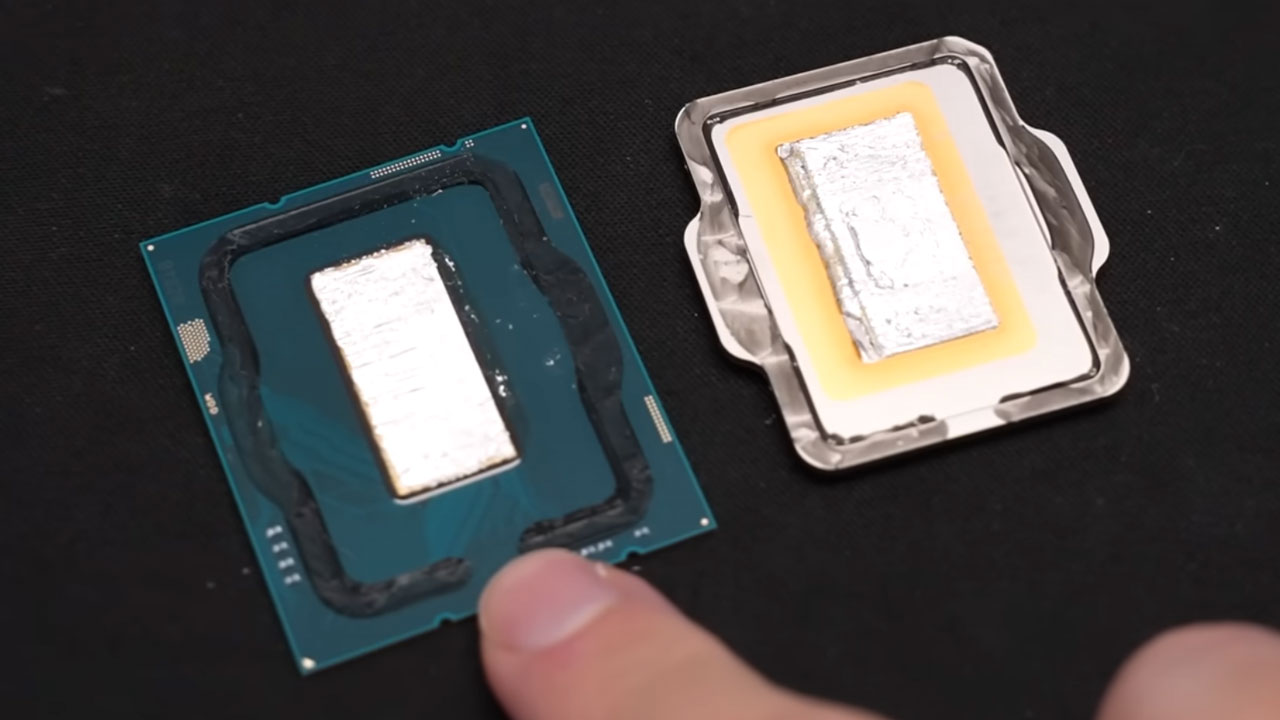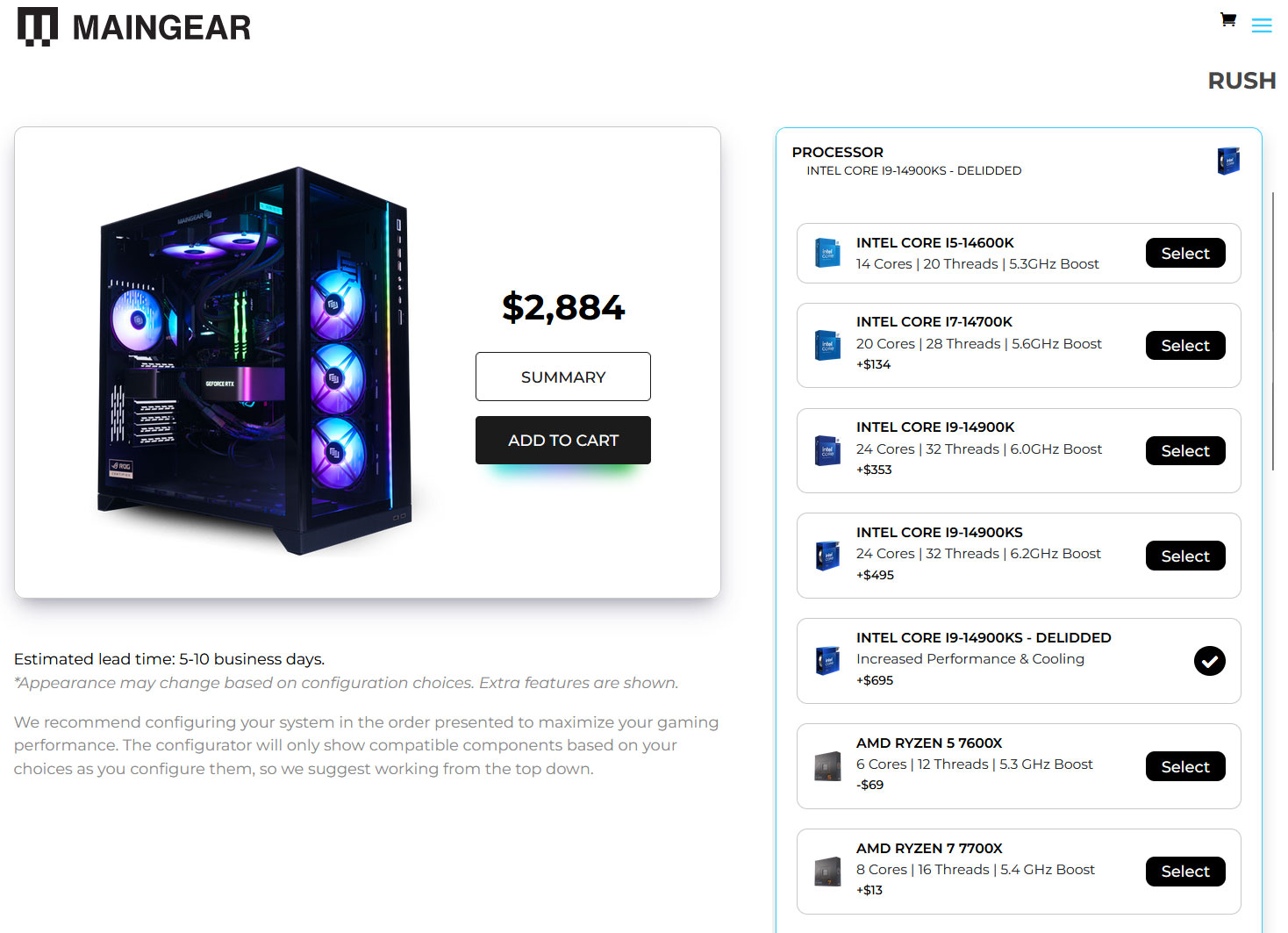Delidded Core i9-14900KS PCs on sale with Intel approval and warranty - Maingear among first partners
Prepare to pay an extra $200 vs a 'standard' Core i9-14900KS model.

Intel is working with select PC makers to offer warranty-backed systems featuring delidded Core i9-14900KS processors. Overclocker and YouTuber Roman 'der8auer' Hartung commented on this groundbreaking move for Intel in his first video, which looks at what is expected to be the firm's last-ever Core i9 CPU.
The first PC maker seen offering delidded Core i9-14900KS CPUs as an option is Maingear. Atop the already steep Core i9-14900KS build option price, customers are expected to pay a further $200 for the delidded edition. Most Maingear models seemed to offer the delidded Core i9-14900KS as an option at the time of writing. When you upgrade to the delidded Core i9 in the Maingear configurator, you must also choose a 360mm AiO or better as the cooling option.
We've contacted Intel for further details of its new delidded warranty policy. It would be great to know the warranty's T&Cs and the full roster of PC makers that will offer delidded CPU systems. Stay tuned for updates.
Skip to 4 minutes in the above video for the section concerning delidded chips being offered by system integrators.
Regarding the upcoming delidded Core i9-14900KS pre-built systems, der8auer heralded them as "something special, something I have not seen and heard about before." Of course, PC makers could always do as they wished, but the key point is that these approved delidded 14900KS systems will "come officially with Intel's warranty," said der8auer.
The overclocking expert wondered openly what cooling solution would be used with these upcoming high-end delidded systems. He reckons it is quite obvious they will probably be pre-fitted with a direct die cooling solution. They may also use liquid metal thermal compounds, as we have previously seen der8auer combine with direct die coolers. We are aware that exposed CPU dies can be relatively fragile, so PC makers could potentially apply some kind of anti-tamper stickers for warranty verification. Maingear's product pages don't provide sufficient depth of detail to answer these questions.

Intel's delidded warranty coverage is welcomed, and der8auer even sounds hopeful that there might also be an avenue for "us normal consumers" to get approved delidded chips for DIY projects. While Intel can ensure some degree of quality and process control with selected system integrators, any similar scheme will be more challenging to implement for DIYers.
Get Tom's Hardware's best news and in-depth reviews, straight to your inbox.
Der8auer has said he will soon upload part two of his Intel Core i9-14900KS coverage. In his next video, he will concentrate on delidding the 14900KS sample(s) in his possession and checking out the impacts on overclocking, performance, and temperatures. The content is set to be a must-watch for anyone who demands the most from their PC and might be targeted by the select PC makers who will be marketing delidded 14900KS systems.

Mark Tyson is a news editor at Tom's Hardware. He enjoys covering the full breadth of PC tech; from business and semiconductor design to products approaching the edge of reason.
-
Roland Of Gilead $200 for the delid, and another $200 for the appropriate cooling. Eh, no thanks. But each to their own.Reply -
leoneo.x64 Reply
They should charge $50 less for this, with half the warranty period of the with-IHS chip. The risk is with the customer and Intel is spending less on material and one step less in assembling.Admin said:Intel is working with select PC makers like Maingear to offer warranty-backed systems featuring delidded Core i9-14900KS processors.
Delidded Core i9-14900KS PCs on sale with Intel approval and warranty - Maingear among first partners : Read more
They shelved their TEC coolers too soon. This edition should have come with that cooler bundled, now that would be worth paying 200 extra for. -
HyperMatrix Intel says Liquid Metal usage that causes stains on the IHS voids warranty. Now they’re giving warranty on delidded systems? Must come with some very strict terms and conditions that include no opening of the pre-installed cooler.Reply -
bit_user If you think about it, the only way this really differs from laptop CPUs is that Intel ships the CPU with the IHS in place & the builder needs to remove it. If Intel sold them a special version without the IHS, then it would just be a socketed equivalent of what they do for laptop makers.Reply -
atomicWAR I remember when CPUs didn't use heat spreader at all. I never thought I'd miss those days but with the temps on current gen CPUs getting so high with heat spreaders on...I have begun to long for the days of old where you the user had to apply thermal paste and mount your cooling directly to the die. Yes it required you to be more careful mounting your cooler/water block so not to break the silicon with too much pressure, that you apply your thermal compound properly to avoid cooking your CPU or didn't apply enough mounting pressure for proper thermal transfers. Yes I know smaller nodes, hotspots, etc etc being issues but I'd prefer have a warrantied choice for delidded CPUs even if I understand why Intel/AMD are hesitant to do so.Reply
Yeah I'd be willing to pay an extra 50 bucks for a delidded CPU with a warranty but 200? Yeah not so much, I am with you there. Cooling wise...I already run an over kill custom loop with a 360 by 80mm thick rad so cooling capacity is a non-issue for myself. I do question though the need of a 360 aio or better cooler for a delid (though I wouldn't run anything less personally). I'd think anything capable of cooling a CPU with a heat spreader on would also be fine for a delid (thermally speaking and assuming proper contact of course) as you still need to flush X amount of heat from the system regardless of the mounting process. I am curious if someone more eduacated in heat disappation might have something to add to this conversation as I could well be wrong. Regardless though if your running a delid I'd think you'd want the best cooling capacity one could afford.Roland Of Gilead said:$200 for the delid, and another $200 for the appropriate cooling. Eh, no thanks. But each to their own.
I've seen TEC coolers since the 90s and generally speaking they haven't been worth it or matured as I would have hoped. They are either implemented in a fashion where they are to weak to cool the chip properly so you thermal throttle at full load or they are so strong they double your CPU power usage (CPU wattage plus equivalent or better TEC wattage...200 watts of tec to cool 200 watts from the CPU) at which point you have to prep your system for sub-ambient cooling (condensation to outright sub zero freezing). I would like to see someone fix these TEC issues so your chip runs cool yet above ambient temps. I find it unlikely to be accomplished in the near future, if at all given the rate of progress thus far, as I would have expected this to already to have been done considering how long TECs have been around in one form or another in the experimental/ultra enthusiast niches. Maybe as chips get hotter and hotter someone will iron these wrinkles out for main stream or at least make things more palpable for the average user.leoneo.x64 said:They shelved their TEC coolers too soon. This edition should have come with that cooler bundled, now that would be worth paying 200 extra for. -
-Fran- AMD, please take note.Reply
Hell, I won't even say fully delided, but just thin/scrub/remove some of that chonker IHS crappy metal you have on your dies and allow HSF/Cooler makers help you with support. Keep some stock of chonky IHS for OEMS and fullfill their orders, but for DYI just sell some thin out versions, please. Ideally delidded!
Regards. -
bit_user Reply
Yes. As long as the waterblock is designed to use direct-die cooling, then whatever radiator you use with the IHS intact should easily be good enough for direct-die.atomicWAR said:Cooling wise...I already run an over kill custom loop with a 360 by 80mm thick rad so cooling capacity is a non-issue for myself. I do question though the need of a 360 aio or better cooler for a delid (though I wouldn't run anything less personally). I'd think anything capable of cooling a CPU with a heat spreader on would also be fine for a delid
With direct-die cooling, the water temp should be higher, downstream of the waterblock. The larger the temperature difference, the easier it should be for a radiator to cool down.
https://en.wikipedia.org/wiki/Newton%27s_law_of_cooling
Newton's law of cooling is also why I think it would make sense to have TEC integrated into the end-stage of a radiator. In a normal radiator, you get very little additional cooling, near the outlet. That's exactly where TEC could have the biggest impact.atomicWAR said:I would like to see some fix these TEC issues so your chip runs cool yet above ambient temps. -
bit_user Reply
Essentially, I think you're asking AMD to make an AM5 rev. B socket spec that's a bit shorter. I'd agree, especially if Zen 5 manages to scale performance better at higher frequencies (though I don't think that's a given).-Fran- said:AMD, please take note.
Hell, I won't even say fully delided, but just thin/scrub/remove some of that chonker IHS crappy metal you have on your dies and allow HSF/Cooler makers help you with support. Keep some stock of chonky IHS for OEMS and fullfill their orders, but for DYI just sell some thin out versions, please. Ideally delidded! -
cyrusfox Reply
I was thinking about this yesterday and I reckon they are not saving on any material or assembly as I believe these highly binned chips are tested when fully assembled(going through the same standard package and testing as the rest of 12/13/14 desktop chips). Which would mean Intel is delidding them is adding an extra step and perhaps shipping them out to OEM in modified trays.leoneo.x64 said:They should charge $50 less for this, with half the warranty period of the with-IHS chip. The risk is with the customer and Intel is spending less on material and one step less in assembling.
They shelved their TEC coolers too soon. This edition should have come with that cooler bundled, now that would be worth paying 200 extra for.
I may be wrong about the chip build and test flow, and maybe they are able to cut out attaching IHS. Being nimble/opportunistic by changing process flows is not something Intel has historically been known for. But this new Foundry effort is going to challenge them on that front and largely their success or lack of success in Foundry will be a good metric to measure whether they are able to adapt to customers and the market demands. Can this laggard regain the crown? -
atomicWAR Reply
Interesting idea. I thought of using a TEC to basically turn a loop into a chiller. Are you talking something similar? I'd love to hear more on y our idea. My concern was again creating sub-ambient temps freezing my fluid but I assume if your TEC was rated for a lower wattage and you implemented it correctly you could be close to or just over ambient. Though I would think you'd need a software sensor interface to ensure your TEC powers up/down according to CPU usage and temps (both CPU and water). I am aware of some air cooler TEC hybrids that attempted as much with temps updating the TEC to cool accordingly though the left much to be desired as the TECs in and of themselves were under-powered for most CPU to avoid throttling during extended full loads.bit_user said:Newton's law of cooling is also why I think it would make sense to have TEC integrated into the end-stage of a radiator. In a normal radiator, you get very little additional cooling, near the outlet. That's exactly where TEC could have the biggest impact.

